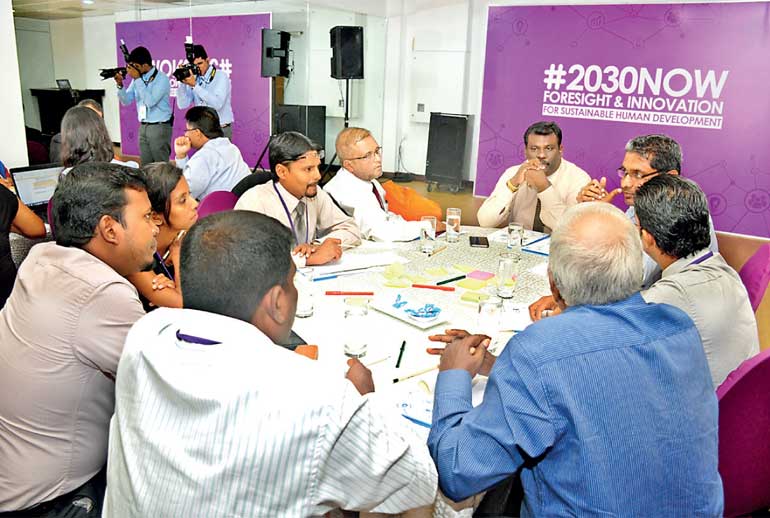Monday Feb 16, 2026
Monday Feb 16, 2026
Tuesday, 31 May 2016 00:04 - - {{hitsCtrl.values.hits}}
By Shiran Illanperuma
Government policy has been inadequate in stemming the degradation of Sri Lanka’s natural environment and the country is far from achieving sustainability according to a United Nations Development Programme (UNDP) expert at the recent National Summit on Foresight and Innovation for Sustainable Human Development.
In a session on ‘Environment and Energy’, focusing on ‘Climate Action’, UNDP Environment Cluster Assistant Country Director for Sri Lanka Dr. Visaka Hidellage outlined Sri Lanka’s past efforts to move towards sustainability while highlighting the nation’s international commitments to stemming climate change.
Sri Lanka has signed a number of treaties relating to the environment and climate change. These treaties broach a wide variety of topics including sustainable development, disaster management, biodiversity convention, land degradation and much more. Sri Lanka, has since struggled to put these treaties into action.
 Participants at the Climate Action segment of the National Summit on Foresight and Innovation for Sustainable Human Development
Participants at the Climate Action segment of the National Summit on Foresight and Innovation for Sustainable Human Development
“In 2009, the country decided to try to shift its course towards sustainable development. We set up a National Council on Sustainable Development. Similarly, the ‘Haritha Lanka’ program was developed by the Ministry of Environment,” said Hidellage.
“The private sector began to fall in line and there were a few changes that were pledged including triple bottom line reporting, green jobs and green procurement. These things happened not only because of ‘Haritha Lanka’ but because green development and green growth were global trends at the time. Sadly, the program has since lost momentum,” she added.
Hidellage also emphasised the interconnectedness of sustainability with broader policy frameworks relating to disaster management and development.
“In 2005 the world agreed to something called Hyogo Framework in the aftermath of the Indian Ocean tsunami. The disaster management framework was very comprehensive but halfway through implementation, the world realised that the most fundamental changes were not happening – that is, changes in the nexus between disaster, environment, poverty and development.”
Global climate change poses a particularly harsh threat to Sri Lanka which has seen its environment harmed by actions and policies at the domestic level explained Hidellage.
“Whatever changes that climate change brings will be made much more difficult for us to handle because of what we have already done. Our forest degradation rates are very high; we have water pollution, soil erosion, contamination issues and coastal issues. We have to tackle these issues at the domestic level first,” she said.
Despite the backsliding of Sri Lanka’s environment due to unsustainable development practices, Hidellage points out that there are plenty of existing legal precedents to protect the environment, though they are seldom used.
“The constitution of Sri Lanka says that the Government and the individuals of this country are mandated to protect the environment. There are a large number of legislations, acts and frameworks in place to protect the environment. Some of these cut across a number of agencies but they have sadly been inadequate.”
With climate change and global warming gaining widespread recognition in the scientific community and civil society, Governments (including Sri Lanka) are beginning to take notice, responding by taking incremental steps towards sustainability. The recently announced Social Development Goals (SDGs) by the UNDP have set an international standard for countries to aspire to.
“Climate change has been a big topic over the last three decades. Hopefully the SDGs will shape our future and push for the transformation we are looking for. Finally we have reached acceptance and the world is trying to do something,” said Hidellage.
“Since the early 2000s there has not been a big change in the fundamental way that we do things. There is better awareness than before to be sure, but we have not truly transformed into a sustainable society.”
Pix by Bhanuka Kirinde